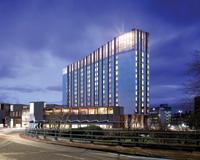Birmingham’s Five Ways shopping centre and neighbouring Auchinleck House have defied redevelopment for the past 10 years. Mars Pension Fund, Manx developer Dandara, Frontier Estates, Taylor Woodrow and Birmingham Property Group have all tried and failed to redevelop the shopping centre and office block on the city fringe. Now Seven Capital is promising a £100m redevelopment – and it looks as if it might succeed.
After so many years of failure, it has taken five keys to unlock Five Ways. They are: a good business idea; timing; a low purchase price; the government’s tax-efficient renovation allowance; and, by far the most important, developer/investor Balbinder Singh Sohal. That is because Sohal’s money and connections have made the latest scheme possible (see below).
Buying the prominent gateway site at a good price was the first stage in freeing Five Ways from years of dereliction. Although the price for the 2.34-acre freehold has not been disclosed, it is thought to be lower than the £20m quoted in 2006.
According to Phil Carlin, managing director at Seven Capital: “Aspirations on land value are down 20% on the peak, and that has really helped.” The deal with vendor LaSalle Investment Management was completed last September.
Next came the business proposition, something that Sohal was able to put together. The Park Regis Birmingham scheme, as Seven Capital wants it to be known, is based on the appeal of a four-star hotel linked to what will be the largest banqueting venue in the city – and all of it at a gateway site a short stroll from the city’s convention centre.
No longer forced to schlep out to the National Exhibition Centre for a big event, the 150,600 sq ft ballroom will attract events needing the largest single-span space of its kind in the region, and capable of seating 1,200. On top of it will sit another ballroom about two-thirds as big, and both will be part of the same complex as a four-star Park Regis hotel, operated by Sohal’s Australian hospitality chain Staywell. The hotel will be created in what was once Auchinleck House, an empty office block.
Finally, there is the funding deal. The 460,000 sq ft scheme hinges on the tax-efficient Business Premises Renovation Allowance, which gives an initial allowance of 100% for expenditure on converting or renovating unused business premises in a disadvantaged area.
Carlin explains: “Through the BPRA structure we forward-sold the hotel component, which is half the project, to a syndicate for £48.5m and, of that, £27m was a loan from Mr Sohal’s businesses. Normally, you need bank debt for BPRA to work, but we came late to the market. It’s slightly unorthodox, but we were able to use our strong capital base to get this going.”
Funding for the second half – which includes the shopping centre and the banqueting suite – is now being assembled. “If there’s a bank out there that wants to get involved, then please get in touch. But if not, and it’s a difficult market, we will use the cash resources that we have already demonstrated are available,” says Carlin.
Development director Andy Robinson adds: “We are not saying BPRA is an easy route – it isn’t – and our investors are savvy people, and they won’t invest in things that won’t happen. You have to present them with a real opportunity, with something they believe in. BPRA is a great scheme, but it’s only one of the drivers behind this site. It was a real property opportunity, not a tax-driven development.”
Planning permission for the entire project was approved in March and work on site can now begin. Work on the hotel is expected to start early next year, with completion 18 to 24 months later. Carlin hopes the second phase will be open at about the same time.
The timing could not be better, says Carlin: “You need the stars to align for you.”
The proposed redevelopment of the 1960s Five Ways complex could succeed where others have failed because, says Carlin, the hard work is already done.
“We have planning permission, we have forward-sold it, this isn’t a pipe dream with CGI pictures, it’s sort of a development that is already done,” he insists. And by the look of it, he is right.
WHO IS BALBINDER SINGH SOHAL?
Balbinder Singh Sohal is not well known in Birmingham property circles, but he should be as he prepares to make more buys in the city.
Sohal, 37, is the owner of Seven Capital. In 2005, he bought Rutland House, Edmund Street, through his company, Remax Rutland. The price was said to be around £17m. The 75,000 sq ft prime office building was given a £9m refurbishment, which helped take rental income from £17 per sq ft to £23.75 per sq ft on a longer lease. In February 2010, it was sold to Aviva Investor Pensions for £27m, reflecting a yield of 6.09%.
Development is under way in London at Great Eastern Street, EC2, where the company is working on a 76,000 sq ft scheme for hospitality company Staywell. It follows a 27,600 sq ft office development at Kirby Street, EC1.
Sohal’s UK companies do not reveal much about the £500m asset base, which Seven Capital says he controls. At 30 September 2011, Seven Capital reported a loss of £177,000 on a turnover of £24,000. Sister company Group 7 Properties had net liabilities of £908,000 at 30 April 2011.











